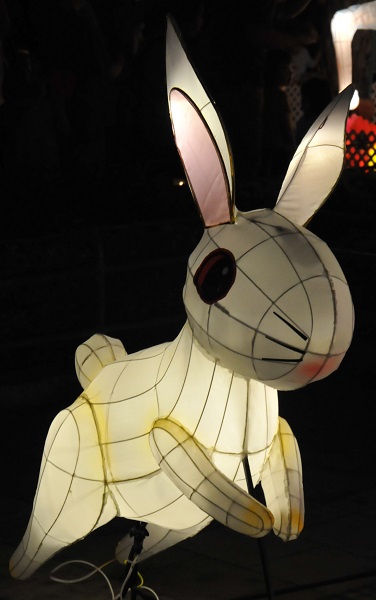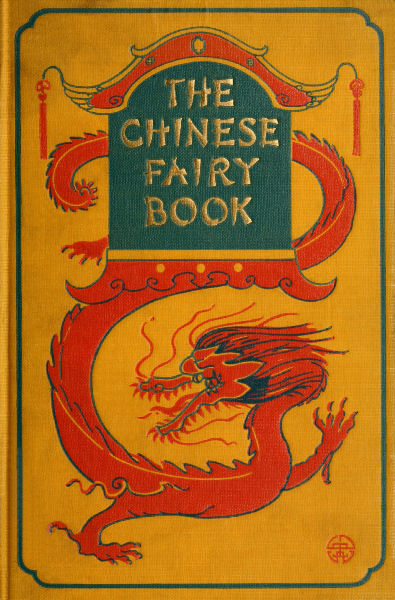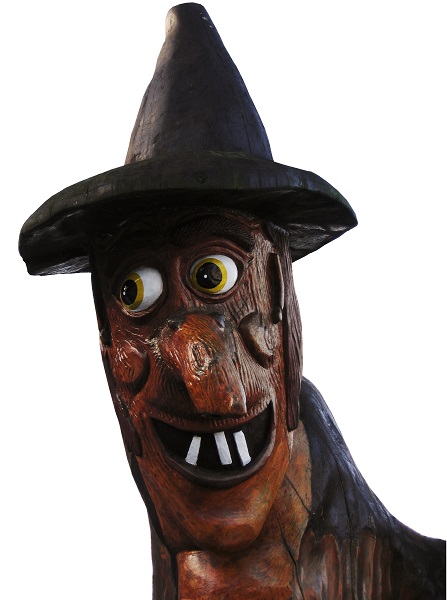THE MYRTLE (Stories from Pentamerone, 1637) by Giambattista Basile

There lived in the village of Miano a man and his wife, who had no children whatever, and they longed with the greatest eagerness to have an heir. The woman, above all, was for ever saying, “O heavens! if I might but have a little baby—I should not care, were it even a sprig of a myrtle.” And she repeated this song so often, and so wearied Heaven with these words, that at last her wish was granted; and at the end of nine months, instead of a little boy or girl, she placed in the hands of the nurse a fine sprig of myrtle. This she planted with great delight in a pot, ornamented with ever so many beautiful figures, and set it in the window, tending it morning and evening with more diligence than the gardener does a bed of cabbages from which he reckons to pay the rent of his garden.
Now the King’s son happening to pass by, as he was going to hunt, took a prodigious fancy to this beautiful plant, and sent to ask the mistress of the house if she would sell it, for he would give even one of his eyes for it. The woman at last, after a thousand difficulties and refusals, allured by his offers, dazzled by his promises, frightened by his threats, overcome by his prayers, gave him the pot, beseeching him to hold it dear, for she loved it more than a daughter, and valued it as much as if it were her own offspring. Then the Prince had the flower-pot carried with the greatest care in the world into his own chamber, and placed it in a balcony, and tended and watered it with his own hand.
It happened one evening, when the Prince had gone to bed, and put out the candles, and all were at rest and in their first sleep, that he heard the sound of some one stealing through the house, and coming cautiously towards his bed; whereat he thought it must be some chamber-boy coming to lighten his purse for him, or some mischievous imp to pull the bed-clothes off him. But as he was a bold fellow, whom none could frighten, he acted the dead cat, waiting to see the upshot of the affair. When he perceived the object approach nearer, and stretching out his hand felt something smooth, and instead of laying hold, as he expected, on the prickles of a hedgehog, he touched a little creature more soft and fine than Barbary wool, more pliant and tender than a marten’s tail, more delicate than thistle-down, he flew from one thought to another, and taking her to be a fairy (as indeed she was), he conceived at once a great affection for her. The next morning, before the Sun, like a chief physician, went out to visit the flowers that are sick and languid, the unknown fair one rose and disappeared, leaving the Prince filled with curiosity and wonder.
But when this had gone on for seven days, he was burning and melting with desire to know what good fortune this was that the stars had showered down on him, and what ship freighted with the graces of Love it was that had come to its moorings in his chamber. So one night, when the fair maiden was fast asleep, he tied one of her tresses to his arm, that she might not escape; then he called a chamberlain, and bidding him light the candles, he saw the flower of beauty, the miracle of women, the looking-glass and painted egg of Venus, the fair bait of Love—he saw a little doll, a beautiful dove, a Fata Morgana, a banner—he saw a golden trinket, a hunter, a falcon’s eye, a moon in her fifteenth day, a pigeon’s bill, a morsel for a king, a jewel—he saw, in short, a sight to amaze one.
In astonishment he cried, “O sleep, sweet sleep! heap poppies on the eyes of this lovely jewel; interrupt not my delight in viewing as long as I desire this triumph of beauty. O lovely tress that binds me! O lovely eyes that inflame me! O lovely lips that refresh me! O lovely bosom that consoles me! Oh where, at what shop of the wonders of Nature, was this living statue made? What India gave the gold for these hairs? What Ethiopia the ivory to form these brows? What seashore the carbuncles that compose these eyes? What Tyre the purple to dye this face? What East the pearls to string these teeth? And from what mountains was the snow taken to sprinkle over this bosom—snow contrary to nature, that nurtures the flowers and burns hearts?”
So saying he made a vine of his arms, and clasping her neck, she awoke from her sleep and replied, with a gentle smile, to the sigh of the enamoured Prince; who, seeing her open her eyes, said, “O my treasure, if viewing without candles this temple of love I was in transports, what will become of my life now that you have lighted two lamps? O beauteous eyes, that with a trump-card of light make the stars bankrupt, you alone have pierced this heart, you alone can make a poultice for it like fresh eggs! O my lovely physician, take pity, take pity on one who is sick of love; who, having changed the air from the darkness of night to the light of this beauty, is seized by a fever; lay your hand on this heart, feel my pulse, give me a prescription. But, my soul, why do I ask for a prescription? I desire no other comfort than a touch of that little hand; for I am certain that with the cordial of that fair grace, and with the healing root of that tongue of thine, I shall be sound and well again.”
At these words the lovely fairy grew as red as fire, and replied, “Not so much praise, my lord Prince! I am your servant, and would do anything in the world to serve that kingly face; and I esteem it great good fortune that from a bunch of myrtle, set in a pot of earth, I have become a branch of laurel hung over the inn-door of a heart in which there is so much greatness and virtue.”
The Prince, melting at these words like a tallow-candle, began again to embrace her; and sealing the latter with a kiss, he gave her his hand, saying, “Take my faith, you shall be my wife, you shall be mistress of my sceptre, you shall have the key of this heart, as you hold the helm of this life.” After these and a hundred other ceremonies and discourses they arose. And so it went on for several days.
But as spoil-sport, marriage-parting Fate is always a hindrance to the steps of Love, it fell out that the Prince was summoned to hunt a great wild boar which was ravaging the country. So he was forced to leave his wife. But as he loved her more than his life, and saw that she was beautiful beyond all beautiful things, from this love and beauty there sprang up the feeling of jealousy, which is a tempest in the sea of love, a piece of soot that falls into the pottage of the bliss of lovers—which is a serpent that bites, a worm that gnaws, a gall that poisons, a frost that kills, making life always restless, the mind unstable, the heart ever suspicious. So, calling the fairy, he said to her, “I am obliged, my heart, to be away from home for two or three days; Heaven knows with how much grief I tear myself from you, who are my soul; and Heaven knows too whether, ere I set out, my life may not end; but as I cannot help going, to please my father, I must leave you. I, therefore, pray you, by all the love you bear me, to go back into the flower-pot, and not to come out of it till I return, which will be as soon as possible.”
“I will do so,” said the fairy, “for I cannot and will not refuse what pleases you. Go, therefore, and may the mother of good luck go with you, for I will serve you to the best of my power. But do me one favour; leave a thread of silk with a bell tied to the top of the myrtle, and when you come back pull the thread and ring, and immediately I will come out and say, Here I am.'”
The Prince did so, and then calling a chamberlain, said to him, “Come hither, come hither, you! Open your ears and mind what I say. Make this bed every evening, as if I were myself to sleep in it. Water this flower-pot regularly, and mind, I have counted the leaves, and if I find one missing I will take from you the means of earning your bread.” So saying he mounted his horse, and went, like a sheep that is led to the slaughter, to follow a boar. In the meanwhile seven wicked women, with whom the Prince had been acquainted, began to grow jealous; and being curious to pry into the secret, they sent for a mason, and for a good sum of money got him to make an underground passage from their house into the Prince’s chamber. Then these cunning jades went through the passage in order to explore. But finding nothing, they opened the window; and when they saw the beautiful myrtle standing there, each of them plucked a leaf from it; but the youngest took off the entire top, to which the little bell was hung; and the moment it was touched the bell tinkled and the fairy, thinking it was the Prince, immediately came out.
As soon as the wicked women saw this lovely creature they fastened their talons on her, crying, “You are she who turns to your own mill the stream of our hopes! You it is who have stolen the favour of the Prince! But you are come to an end of your tricks, my fine lady! You are nimble enough in running off, but you are caught in your tricks this time, and if you escape, you were never born.”
So saying, they flew upon her, and instantly tore her in pieces, and each of them took her part. But the youngest would not join in this cruel act; and when she was invited by her sisters to do as they did, she would take nothing but a lock of those golden hairs. So when they had done they went quickly away by the passage through which they had come.
Meanwhile the chamberlain came to make the bed and water the flower-pot, according to his master’s orders, and seeing this pretty piece of work, he had like to have died of terror. Then, biting his nails with vexation, he set to work, gathered up the remains of the flesh and bones that were left, and scraping the blood from the floor, he piled them all up in a heap in the pot; and having watered it, he made the bed, locked the door, put the key under the door, and taking to his heels ran away out of the town.
When the Prince came back from the chase, he pulled the silken string and rung the little bell; but ring as he would it was all lost time; he might sound the tocsin, and ring till he was tired, for the fairy gave no heed. So he went straight to the chamber, and not having patience to call the chamberlain and ask for the key, he gave the lock a kick, burst open the door, went in, opened the window, and seeing the myrtle stript of its leaves, he fell to making a most doleful lamentation, crying, shouting, and bawling, “O wretched me! unhappy me! O miserable me! Who has played me this trick? and who has thus trumped my card? O ruined, banished, and undone prince! O my leafless myrtle! my lost fairy! O my wretched life! my joys vanished into smoke! my pleasures turned to vinegar! What will you do, unhappy man! Leap quickly over this ditch! You have fallen from all happiness, and will you not cut your throat? You are robbed of every treasure! You are expelled from life, and do you not go mad? Where are you? where are you, my myrtle? And what soul more hard than marble has destroyed this beautiful flower-pot? O cursed chase, that has chased me from all happiness! Alas! I am done for, I am overthrown, I am ruined, I have ended my days; it is not possible for me to get through life without my life; I must stretch my legs, since without my love sleep will be lamentation, food, poison, pleasure insipid, and life sour.”
These and many other exclamations that would move the very stones in the streets, were uttered by the Prince; and after repeating them again and again, and wailing bitterly, full of sorrow and woe, never shutting an eye to sleep, nor opening his mouth to eat, he gave such way to grief, that his face, which was before of oriental vermilion, became of gold paint, and the ham of his lips became rusty bacon.
The fairy, who had sprouted up again from the remains that were put in the pot, seeing the misery and tribulation of her poor lover, and how he was turned in a second to the colour of a sick Spaniard, of a venomous lizard, of the sap of a leaf, of a jaundiced person, of a dried pear, was moved with compassion; and springing out of the pot, like the light of a candle shooting out of a dark lantern, she stood before Cola Marchione, and embracing him in her arms she said, “Take heart, take heart, my Prince! have done now with this lamenting, wipe your eyes, quiet your anger, smooth your face. Behold me alive and handsome, in spite of those wicked women, who split my head and so ill-treated me.”
The Prince, seeing this when he least expected it, arose again from death to life, and the colour returned to his cheeks, warmth to his blood, breath to his breast. After giving her a thousand caresses and embraces, he desired to know the whole affair from head to foot; and when he found that the chamberlain was not to blame, he ordered him to be called, and giving a great banquet, he, with the full consent of his father, married the fairy. And he invited all the great people of the kingdom, but, above all others, he would have present those seven serpents who had committed the slaughter of that sweet suckling-calf.
And as soon as they had done eating, the Prince asked all the guests, one after another, what he deserved who had injured that beautiful maiden—pointing to the fairy, who looked so lovely that she shot hearts like a sprite and drew souls like a windlass.
Then all who sat at table, beginning with the King, said, one that he deserved the gallows, another that he merited the wheel, a third the pincers, a fourth to be thrown from a precipice; in short one proposed this punishment and another that. At last it came to the turn of the seven wicked women to speak, who, although they did not much relish this conversation, yet, as the truth comes out when the wine goes about, answered, that whoever had the heart basely to touch only this quintessence of the charms of love deserved to be buried alive in a dungeon.
“As you have pronounced this sentence with your own lips,” said the Prince, “you have yourselves judged the cause, you have yourselves signed the decree. It remains for me to cause your order to be executed, since it is you who with the heart of a negro, with the cruelty of Medea, made a fritter of this beautiful head, and chopped up these lovely limbs like sausage-meat. So quick, make haste, lose not a moment! throw them this very instant into a large dungeon, where they shall end their days miserably.”
So this order was instantly carried into execution. The Prince married the youngest sister of these wicked creatures to the chamberlain, and gave her a good portion. And giving also to the father and mother of the myrtle wherewithal to live comfortably, he himself spent his days happily with the fairy; while the wicked women ended their lives in bitter anguish, and thus verified the proverb of the wise men of old—
“The lame goat will hop
If he meets with no stop.”
If you liked this story, leave me a comment down below. Join our Facebook community. And don’t forget to Subscribe!
You might also enjoy other stories by Giambattiste Basile

















